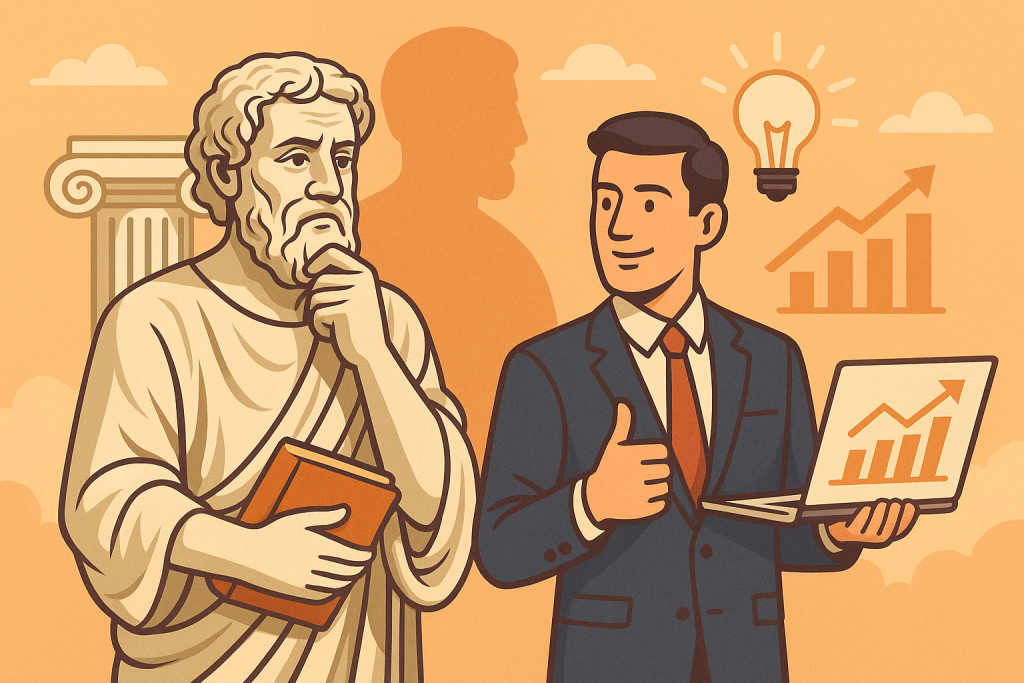The concept of ancient wisdom is emerging as a powerful influence in modern business. Today’s rapidly changing environment—from AI‑driven strategies to remote work and ethical leadership—forces executives to rethink conventional playbooks. Looking back at traditions like Stoicism, Chanakya’s counsel, and Taoist philosophy provides fresh perspectives on leadership, resilience, and purpose. In this guide, we explore how those time‑tested principles can shape smarter business decisions today.

1. Stoic Leadership: Cultivating Inner Strength
Stoicism, practiced by ancient Greeks and Romans, has resurged in business circles. Modern leaders are applying Stoic principles like courage, temperance, justice, and wisdom to manage stress and make rational choices.
Key Lessons:
- Be soft on people, hard on the problem
A Stoic approach encourages empathy toward employees while separating personalities from challenges. As Robert Rosenkranz puts it, “Be soft on the people, be hard on the problem”. - Delegate authority and responsibility
Stoics value rationality and autonomy. Delegating both helps build trust and reduce micromanagement. - Interview for character, not just skills
Stoic-inspired interview questions focus on past behavior and moral flexibility, like asking candidates about a conviction they changed, to reveal deeper values.
These practices promote resilient teams capable of thoughtfully navigating volatility—particularly relevant in times of AI disruption and geopolitical instability.
2. Chanakya and the Art of Practical Strategy
Chanakya, an ancient Indian philosopher and strategist, authored Arthashastra, a treatise on statecraft and economics over 2,000 years ago. Radhakrishnan Pillai’s modern adaptation—Corporate Chanakya—applies these tactics to corporate settings.
Chanakya’s Modern Tips:
- Know your stakeholders – Chanakya emphasized understanding allies and adversaries alike, akin to today’s stakeholder mapping.
- Plan with contingencies – He stressed preparing for multiple scenarios, echoing current risk management practices.
- Lead with ethical influence – Governance and influence based on virtue over coercion aligns with today’s ethical leadership trends.
These strategies offer a structured approach to leadership—blending foresight with moral integrity.
3. Aristotle: Virtue, Character, and Leadership
Fast‑forward to ancient Greece—Aristotle saw phronesis (practical wisdom) and virtues as vital for leadership. Harvard scholars Dana Born and Christopher Megone argue that Aristotle’s view is essential to modern leadership development.
Aristotle-Driven Principles:
- Character underpins trust – Authentic leadership stems from consistent action rooted in virtue.
- Wisdom is learned through practice – Leadership training through scenarios cultivates moral competence.
- Purpose aligns group and purpose – Defining a meaningful organizational mission creates cohesion.
Embedding these principles can help leaders and teams build resilience, direction, and credibility in a distracted era.
4. Taoism and the Power of Non-Action
Taoist philosophy, especially the Tao Te Ching, urges leaders to act with minimal force and flow with natural rhythms.
Taoist-Inspired Tactics:
- Lead softly, yet decisively – Respond calmly but firmly, like water shaping rock.
- Embrace flexibility – Adapting to change by yielding flows more effectively than resistance.
- Cultivate balance – Harmonize work and well-being to avoid burnout.
In practical terms, leaders can structure decision-making processes that are adaptable and avoid overreach—critical when navigating AI and hybrid workplace dynamics.
5. Mindfulness and Well-Being at Work
Ancient Buddhist mindfulness is another concept gaining traction in tech circles. Programs like Google’s “Search Inside Yourself” highlight improved emotional intelligence and focus.
Workplace Applications:
- Regular mindfulness breaks – Short exercises enhance attention and reduce cognitive strain.
- Mindful communication – Active listening fosters better collaboration and psychological safety.
- Stress resilience training – Mindfulness rewires neural pathways to boost empathy and calm under pressure.
These techniques are now being validated through neuroscience and embraced in environments where focus and agility are essential.
6. Collective Wisdom: Harnessing Shared Insight
The concept of collective wisdom has gained traction. Defined as knowledge emerging from group collaboration and deep listening, it encourages diverse perspectives.
Team Implementation Strategies:
- Delphi and crowdsourcing techniques – Gather and refine group insight rather than relying on one voice.
- Devil’s advocacy sessions – Use dissent deliberately to uncover blind spots.
- Cross-functional dialogue – Break silos by structuring broad stakeholder engagement.
This mirrors ancient council systems—valuing inclusive debate and shared stewardship rather than top-down edicts.
7. Ancient Wisdom for AI-Era Ethics
In the Age of AI, legacy wisdom offers moral guardrails. A recent analysis highlights the need for fairness, transparency, and sustainability in digital leadership.
Ethical Leadership Practices:
- Bias audits and fairness reviews – Echoes Stoic temperance and impartiality.
- Transparent AI governance – Builds stakeholder trust through accountability.
- Long-term sustainability goals – Inspired by Confucian respect for harmony and societal good.
Combining ethical strategy with emerging technology helps companies avoid AI missteps and maintain social legitimacy.
8. Why This Trend Matters Now
Rising turbulence—from market volatility to geopolitical shifts and AI transformation—has amplified interest in ancient wisdom in business. Leaders are recognizing that:
- Character and endurance help sustain through crises.
- Holistic frameworks—like virtue, mindfulness, and ethical rigor—support innovation and balance.
- Collective insight improves decision quality in complex environments.
The Harvard forum “Leadership & Wellbeing: How Ancient Wisdom and Scientific Edge Unlock Happiness and Growth” (April 2025) brought together Eastern sages and Western researchers to validate how such ancient practices boost leadership in the AI era.
9. Practical Guide: Integrating Ancient Wisdom Today
Here’s a step‑by‑step framework for bringing these insights into your organization:
- Start with a self‑assessment
Identify areas like ethical lapses, stress indicators, or slow decision cycles. - Select a tradition aligned with your culture
- Tech firms may start with mindfulness (Buddhist methods)
- Consulting firms may favor Stoicism or Chanakya’s strategy
- Incorporate micro‑practices
- 5-minute workplace mindfulness sessions
- Stoic journaling: teaching teams to focus on controllables
- Weekly reflection meetings inspired by Aristotle’s practice approach
- Educate through stories and analogies
Use historical anecdotes—like Chanakya’s adversity lessons—to make concepts relatable. - Measure impact
Track metrics such as stress reduction, productivity, decision speed, and stakeholder trust. - Scale strategically
Pilot in one department, collect feedback, iterate, then broaden adoption.
10. Success Stories
- Tech giant with mindfulness training: Google’s “Search Inside Yourself” program enhanced focus and emotional intelligence across teams.
- Financial firm applying Stoic tools: Rosenkranz’s team used Stoic delegation and interview frameworks to strengthen resilience amid uncertainty.
- Indian metro project leader: E. Sreedharan credited Bhagavad Gita values for clarity and ethical focus in infrastructure delivery.
Conclusion
Blending ancient wisdom with today’s business demands doesn’t mean sacrificing innovation. Quite the opposite: virtues from Stoicism, Chanakya’s clarity, Aristotle’s character, Taoist harmony, Buddhist mindfulness, and collective insight offer robust tools for navigating complexity, leading ethically, and sustaining growth. These principled approaches, now validated by neuroscience and organizational theory, are more than trends—they represent a durable roadmap for modern business resiliency.
By weaving these insights into routines, culture, and decision-making, leaders don’t just adapt to change—they shape it, guided by time-tested wisdom.
References
- Robert Rosenkranz on Stoicism and leadership values ft.com
- Rise of mindfulness in business, including Google’s program ancientwisdomforums.podbean.com+14wired.com+14wired.com+14
- Radhakrishnan Pillai’s Corporate Chanakya insights qa.time.com
- Aristotle’s influence on leadership character mediavillage.com+5hks.harvard.edu+5ft.com+5
- Taoist principles in leadership keencomputer.com+13en.wikipedia.org+13mediavillage.com+13
- Collective wisdom frameworks qa.time.com+9en.wikipedia.org+9researchgate.net+9
- Ethical leadership framework for AI
- Harvard forum on ancient wisdom and leadership qa.time.com+7hks.harvard.edu+7youtube.com+7
- Indian ethos in management (E. Sreedharan) en.wikipedia.org






